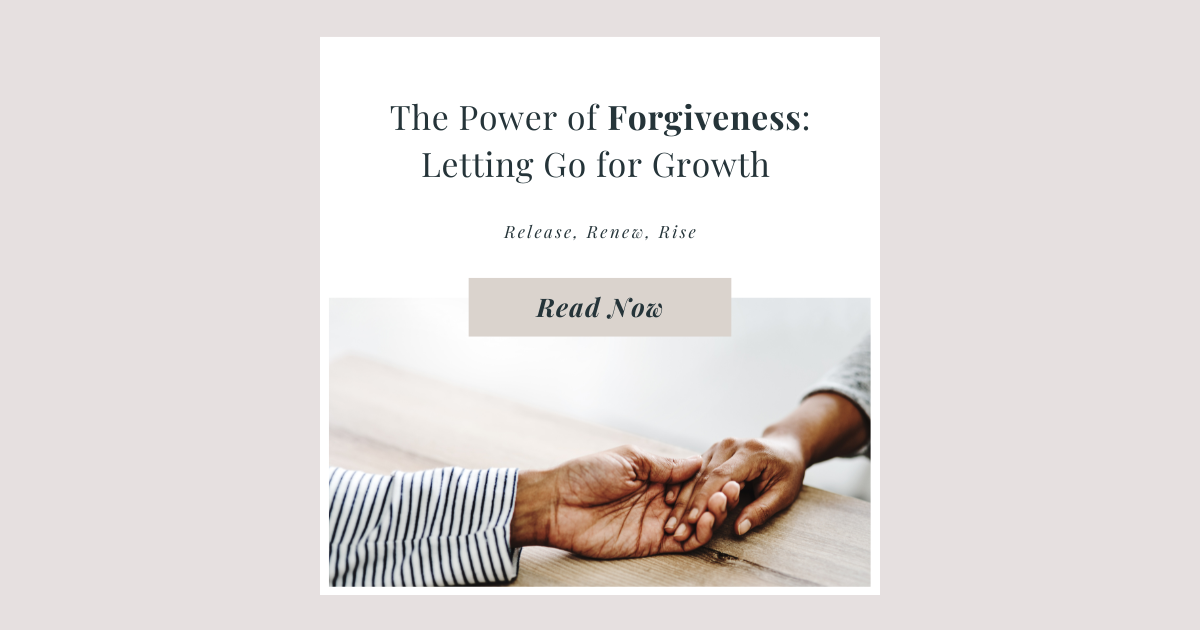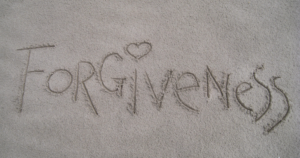The Power of Forgiveness: Letting Go for Growth

Forgiveness is a transformative power that can open the door to personal growth and healing. By letting go of grudges, resentments, and the weight of past hurts, individuals can unlock a profound sense of self-acceptance, inner peace, and renewed purpose. This article delves into the essence of forgiveness, exploring its psychological and emotional benefits, and how the act of forgiveness can fuel a journey of personal transformation.
Embracing forgiveness is not always an easy path, as it requires courage, vulnerability, and a willingness to confront deeply-rooted emotions. Yet, the rewards of this journey are immeasurable, leading to a greater sense of empathy, compassion, and the ability to move forward in meaningful and fulfilling ways.

Key Takeaways
- Forgiveness is a powerful tool for personal growth and healing.
- Letting go of grudges and resentments can foster self-acceptance and inner peace.
- Forgiveness can have a positive impact on relationships, enabling healing and moving forward.
- Overcoming obstacles to forgiveness, such as anger and hurt, is a crucial step in the journey.
- Cultivating empathy and compassion can aid the process of forgiveness and personal transformation.
Understanding the Essence of Forgiveness
Forgiveness is a powerful concept that holds the key to emotional healing and personal growth. At its core, forgiveness is the act of letting go of resentment, anger, or the desire for retaliation towards someone who has wronged us. It’s about freeing ourselves from the burden of holding onto negative emotions and embracing a more positive and compassionate mindset.
What is Forgiveness, and Why is it Important?
Forgiveness is not about condoning the actions of those who have hurt us; rather, it’s about reclaiming our own power and well-being. When we forgive, we acknowledge that the past cannot be changed, but we have the choice to move forward and not let it define us. The importance of forgiveness lies in its ability to free us from the shackles of resentment and allow us to embrace a more fulfilling and harmonious life.
The Psychological and Emotional Benefits of Forgiveness
- Reduced stress and anxiety: By letting go of negative emotions, forgiveness can have a profound impact on our mental and physical health, decreasing stress and anxiety levels.
- Improved relationships: Forgiveness can help heal broken relationships and foster greater understanding, empathy, and connection between individuals.
- Enhanced self-esteem and inner peace: When we forgive, we empower ourselves and cultivate a greater sense of self-acceptance and inner peace.
- Emotional healing: The benefits of forgiveness extend to the emotional realm, allowing us to heal from past hurts and move forward with a renewed sense of hope and positivity.
Embracing the definition of forgiveness and understanding its profound impact on our lives is a crucial step in the journey of personal growth and emotional healing.
Letting Go of Grudges and Resentments
Letting go of grudges and resentments is a crucial step in the forgiveness process. These negative emotions can weigh us down, hindering our personal growth and preventing us from moving forward. However, the path to forgiveness begins with releasing these burdens and embracing a more positive mindset.
One of the key aspects of letting go is recognizing that holding onto grudges is often a form of self-punishment. It keeps us trapped in the past, reliving the pain and anger, rather than allowing us to focus on the present and future. By releasing resentment, we can free ourselves from the emotional baggage and reclaim our power.
- Acknowledge the hurt or betrayal you’ve experienced, but don’t let it define you.
- Identify the specific grievances or resentments you’re holding onto, and consciously work to let go of grudges.
- Practice forgiveness exercises, such as writing a letter to the person who wronged you, or visualizing a scene of forgiveness and release.
The forgiveness process is not always easy, and it’s important to be patient with yourself. Letting go of deeply rooted resentments can take time and require a commitment to personal growth. But with persistence and a willingness to embrace change, you can break free from the shackles of the past and pave the way for a brighter future.
“Holding a grudge is like drinking poison and hoping the other person will die.”
Remember, the journey of forgiveness is not about absolving the other person or condoning their actions. It’s about reclaiming your own power and finding the freedom to move forward, unencumbered by the weight of past hurts. By letting go of grudges and releasing resentment, you can unlock a newfound sense of peace and purpose.
The Impact of Forgiveness on Personal Growth
Forgiveness is not merely an act of letting go – it is a transformative journey that can profoundly impact our personal growth and well-being. When we choose to forgive, we unlock the door to a deeper sense of self-acceptance and inner peace, both of which are essential for continued personal development and fulfillment.
Forgiveness Fosters Self-Acceptance and Inner Peace
By releasing ourselves from the burden of resentment and grudges, forgiveness allows us to embrace the fullness of our humanity, both our strengths and our imperfections. This cultivates a greater sense of self-acceptance, enabling us to move forward with confidence and compassion. Moreover, the act of forgiveness can bring a profound sense of inner peace, freeing us from the emotional turmoil that often holds us back from personal growth.
As we navigate the complexities of life, the ability to forgive ourselves and others is a powerful tool for emotional well-being. When we can let go of past hurts and move forward with a open heart, we create space for personal transformation and the discovery of our true, authentic selves.
| Benefits of Forgiveness | Impact on Personal Growth |
|---|---|
| Self-Acceptance | Increased confidence and self-compassion |
| Inner Peace | Reduced emotional turmoil and greater focus on personal development |
| Emotional Well-Being | Improved overall mental and emotional health |
By embracing the power of forgiveness, we open the doors to a deeper understanding of ourselves and our relationships. This process of self-discovery and personal growth is essential for living a fulfilling and meaningful life.
Forgiveness in Relationships: Healing and Moving Forward
Navigating the complexities of relationships often requires a delicate balance of trust, communication, and the willingness to forgive. Forgiveness is a powerful tool in relationship healing, as it allows individuals to let go of past hurts and rebuild trust. By embracing forgiveness, couples and friends can move forward, fostering a deeper understanding and strengthening the bond between them.
Forgiveness in relationships is not about condoning hurtful actions or behaviors; rather, it’s about acknowledging the pain, understanding the circumstances, and consciously choosing to release the resentment. This process can be challenging, but the rewards are immense. When we forgive, we open the door to relationship healing, allowing both parties to grow and find common ground.
The journey of rebuilding trust after a betrayal or conflict requires patience, empathy, and a willingness to listen and understand each other’s perspectives. By actively practicing forgiveness, individuals can work to restore the foundation of their relationships, paving the way for stronger, more meaningful connections.
“Forgiveness is the fragrance that the violet sheds on the heel that has crushed it.” – Mark Twain
In the context of forgiveness in relationships, it’s important to recognize that the process is not always linear. It may involve setbacks, triggers, and the need for ongoing communication and understanding. However, by approaching forgiveness with compassion and a shared desire for growth, couples and friends can navigate these challenges and emerge with a renewed sense of trust and intimacy.
Steps Towards Forgiveness in Relationships
- Acknowledge the hurt and pain caused by the other person’s actions.
- Seek to understand the underlying reasons or context behind the hurtful behavior.
- Communicate openly and honestly about your feelings, while also listening to the other person’s perspective.
- Consciously choose to let go of resentment and embrace forgiveness, even if the process is gradual.
- Rebuild trust through consistent and transparent communication, as well as by demonstrating a commitment to change.
Ultimately, forgiveness in relationships is a transformative journey that requires courage, vulnerability, and a shared commitment to healing and growth. By embracing this process, individuals can navigate the complexities of their relationships, fostering deeper connections and a stronger foundation for a fulfilling future.
The Power of Forgiveness: Letting Go for Personal Growth
Forgiveness is a transformative power that can unlock profound personal growth. When we learn to let go of grudges and resentments, we open ourselves to a world of new possibilities. This section delves into the profound impact forgiveness can have on our journey of self-discovery and development.
At the heart of forgiveness lies the ability to release the hold that negative emotions have on us. By letting go of the past, we free ourselves from the burden of anger, hurt, and betrayal. This act of liberation is the first step towards personal growth and transformation.
Forgiveness fosters self-acceptance and inner peace. As we learn to forgive others, we also extend that same compassion towards ourselves. This self-forgiveness is essential for personal growth, allowing us to embrace our flaws and shortcomings with empathy and understanding.
“The weak can never forgive. Forgiveness is the attribute of the strong.” – Mahatma Gandhi
The power of forgiveness lies in its ability to reshape our perspectives and unlock new avenues for personal development. When we let go of the past, we create space for growth, learning, and the cultivation of empathy and understanding. This transformative process can lead to a deeper sense of purpose, stronger relationships, and a more authentic, fulfilling life.
Embracing the power of forgiveness is a journey, one that requires courage, self-reflection, and a willingness to let go. By following practical strategies for cultivating forgiveness, individuals can embark on a path of personal growth and self-discovery, unleashing the transformative potential that lies within.
Overcoming Obstacles to Forgiveness
Embarking on the journey of forgiveness can be a challenging and deeply personal process. One of the primary obstacles many face is the lingering feelings of anger, hurt, and betrayal. These powerful emotions can create a barrier, making it difficult to move forward and find true healing.
Addressing Feelings of Anger, Hurt, and Betrayal
Acknowledging and processing these complex emotions is a crucial first step in overcoming the obstacles to forgiveness. It’s important to allow yourself to feel the pain, without becoming consumed by it. Journaling, seeking professional support, or even talking to a trusted friend can all be helpful in this process.
- Recognize and validate your feelings of anger, hurt, and betrayal. These emotions are natural and a part of the healing process.
- Explore the root causes of these feelings. What specific events or actions led to these powerful emotions?
- Practice self-compassion and patience. Forgiveness is not an overnight process; it takes time and effort.
As you navigate these challenging emotions, it’s important to remember that forgiveness is not about condoning the actions of others, but rather about freeing yourself from the burden of resentment. By overcoming the obstacles to forgiveness, you can begin to experience the transformative power of letting go and moving forward.
Cultivating Empathy and Compassion
Forgiveness is not just an intellectual exercise; it requires a deep understanding of others and a genuine desire to connect with their emotions. The key to unlocking the power of forgiveness lies in the cultivation of empathy and compassion. These emotional skills not only help us better comprehend the perspectives and experiences of those who have wronged us but also foster a more forgiving and empathetic mindset.
Empathy, the ability to understand and share the feelings of others, is a crucial component in the forgiveness process. By stepping into the shoes of those who have hurt us, we can gain a clearer picture of their motivations, struggles, and innermost thoughts. This deeper understanding can soften the edges of our own hurt and resentment, paving the way for more meaningful and lasting forgiveness.
Compassion, on the other hand, is the willingness to alleviate the suffering of others. When we cultivate compassion, we move beyond mere understanding and actively seek to support and uplift those who have caused us pain. This compassionate stance not only benefits the recipient but also nourishes our own emotional well-being, promoting a sense of inner peace and growth.
By fostering empathy and compassion, we can transcend the boundaries of our own experiences and connect with the shared humanity that binds us all. This emotional intelligence allows us to approach forgiveness not as a burden, but as a transformative journey that enriches our lives and relationships.
| Empathy | Compassion |
|---|---|
| The ability to understand and share the feelings of others | The willingness to alleviate the suffering of others |
| Helps us comprehend the perspectives and experiences of those who have wronged us | Motivates us to actively support and uplift those who have caused us pain |
| Softens the edges of our own hurt and resentment, paving the way for forgiveness | Nourishes our own emotional well-being, promoting a sense of inner peace and growth |
As we navigate the path of forgiveness, cultivating empathy and compassion can be the guiding lights that illuminate our journey. By embracing these emotional skills, we open ourselves to a deeper understanding and a more profound connection with others, ultimately unlocking the transformative power of forgiveness.
Forgiveness as a Journey: Letting Go Step by Step
Forgiveness is not a single event, but rather a transformative journey of self-discovery and personal growth. The process of forgiving as a journey requires patience, self-reflection, and a willingness to embrace the challenges along the way. By taking a step-by-step approach to forgiveness, individuals can unlock the remarkable benefits of this profound act.
Practical Strategies for Embracing Forgiveness
Embarking on the journey of forgiveness can be daunting, but there are practical strategies that can guide and support the process. Consider the following steps:
- Acknowledge your emotions: Identify and validate the feelings of anger, hurt, or betrayal that may have initially led to resentment.
- Practice self-compassion: Understand that the path to forgiveness is not always linear, and be kind to yourself throughout the journey.
- Seek understanding: Strive to empathize with the perspective of the person who has wronged you, without excusing their actions.
- Let go of the desire for revenge: Recognize that seeking retribution will only perpetuate the cycle of negativity.
- Forgive in your own time: There is no prescribed timeline for the process of forgiveness; honor your personal needs and pace.
By following these practical strategies for embracing forgiveness, individuals can begin to let go of the burdens of the past and open themselves up to the transformative power of forgiveness as a journey.
| Step | Description |
|---|---|
| Acknowledge Emotions | Identify and validate feelings of anger, hurt, or betrayal that led to resentment. |
| Practice Self-Compassion | Understand that the path to forgiveness is not linear, and be kind to yourself. |
| Seek Understanding | Empathize with the perspective of the person who wronged you, without excusing their actions. |
| Let Go of Revenge | Recognize that seeking retribution will only perpetuate the cycle of negativity. |
| Forgive in Your Own Time | Honor your personal needs and pace; there is no prescribed timeline for forgiveness. |
“Forgiveness is not an occasional act; it is a permanent attitude.” – Martin Luther King Jr.
The Role of Self-Forgiveness in Personal Growth
Embarking on a journey of personal growth requires more than just identifying areas for improvement. It demands a deep level of self-acceptance and compassion – qualities that are often nurtured through the practice of self-forgiveness.
Self-forgiveness is a powerful tool that can unlock the doors to personal transformation. By letting go of self-judgment, regret, and shame, individuals can cultivate a greater sense of self-acceptance and self-compassion. These traits are essential for fostering the resilience and self-belief needed to overcome challenges and embrace meaningful growth.
When we extend forgiveness to ourselves, we create a space for personal growth to flourish. We free ourselves from the burden of past mistakes, allowing us to focus on the present and chart a course towards the future we envision. This liberation empowers us to take risks, try new things, and embrace personal development without the shackles of self-criticism.
Ultimately, the journey of self-forgiveness and personal growth are inherently linked. By embracing self-forgiveness, individuals can unlock the door to greater self-acceptance, self-compassion, and the resilience needed to navigate the path of continuous personal growth.
Forgiveness and Spirituality: Finding Meaning and Purpose
The journey of personal growth and inner transformation often intersects with the act of forgiveness. As we navigate the complexities of life, the ability to let go of grudges and resentments can open the door to a deeper understanding of our own spirituality and the search for meaning and purpose.
Forgiveness, when viewed through the lens of spirituality, can be a profoundly liberating experience. It allows individuals to transcend the limitations of their own circumstances and connect with a higher power or a sense of the divine. By releasing the burden of past hurts, individuals can cultivate a greater sense of empathy, compassion, and appreciation for the interconnectedness of all things.
- Forgiveness as a spiritual practice: Exploring the link between forgiveness and the search for meaning and purpose.
- The transformative power of forgiveness: How it can lead to inner growth and a deeper connection with one’s spirituality.
- Forgiveness and the pursuit of personal growth: Unlocking the door to a more fulfilling and meaningful existence.
When we approach forgiveness from a spiritual perspective, it becomes a tool for personal transformation. It can help us find the courage to confront our own shortcomings, cultivate a greater sense of empathy, and ultimately, discover a deeper sense of purpose and connection with the world around us.
| Forgiveness and Spirituality | Key Benefits |
|---|---|
| Connecting with a higher power | Increased sense of meaning and purpose |
| Cultivating empathy and compassion | Deeper personal growth and transformation |
| Releasing the burden of past hurts | Greater inner peace and emotional well-being |
As individuals embark on the journey of forgiveness, they may find that the spiritual dimensions of this process can unlock a deeper understanding of themselves and their place in the world. By embracing forgiveness as a means of personal growth and inner transformation, we can unlock the true power of this profound and transformative act.
The Ripple Effect of Forgiveness
When we embrace the power of forgiveness, we unlock a profound opportunity for personal growth and transformation. As we let go of grudges and resentments, we create a ripple effect that extends far beyond our individual lives. This ripple effect has the potential to inspire positive change within our relationships, communities, and even the broader society.
Forgiveness is not just a personal act; it is a catalyst for social progress. By modeling the courage to forgive, we can inspire others to follow suit, fostering empathy, understanding, and healing. This collective shift in mindset can lead to the resolution of conflicts, the mending of broken bonds, and the creation of more harmonious and compassionate communities.
When we embrace forgiveness, we become agents of change, shaping the world around us through our actions and choices. The impact of our forgiveness can reverberate through the lives of those we encounter, encouraging them to also let go of their own hurts and move forward with renewed hope and resilience. This ripple effect has the power to transcend individual boundaries, contributing to a more peaceful and inclusive society.



